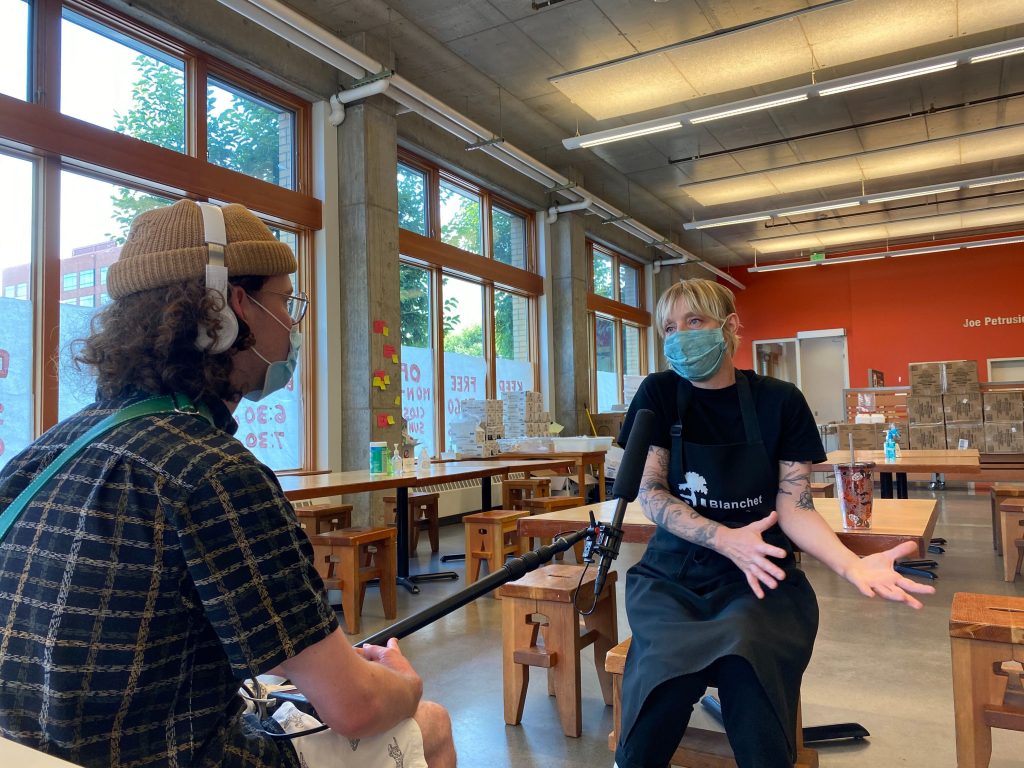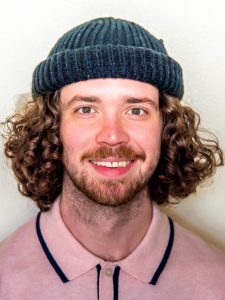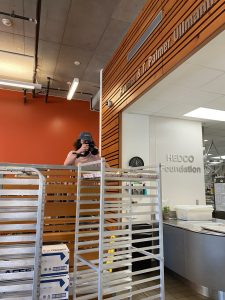
Clark College sophomore Nick Gibson successfully pursued two hands-on community journalism opportunities over the summer. The experience he gained will enhance his job as editor-in-chief of Clark’s student news magazine, The Indy, for the 2020-21 academic year.
His first project was working as a news intern at The Columbian, Vancouver’s daily newspaper. The paid internship was provided by the Dee Ann Finken Fund through Clark College Foundation.
NPR’s Next Generation Radio
Gibson’s second summer project was being selected by Oregon Public Broadcasting to participate in National Public Radio’s Next Generation Radio Project for outstanding college journalists. Now in its 20th year, NPR Next Gen selects emerging journalists who are either still in school or recently graduated and provides them with five days of training to produce a radio news piece.
Clark journalism professor and Indy adviser Beth Slovic encouraged Gibson to apply to Next Gen. Gibson applied, but was doubtful that a community college student would be selected.
“I didn’t believe I had any chance of getting this NPR fellowship experience,” he says. “I don’t have access to the equipment or the training that these big institutions have.”
“I like to think The Indy lets students follow their interest,” Slovic says. “I knew radio was Nick’s primary interest. I’m proud of the work Nick did with the project. I think it was great preparation for his work at The Indy, and I know he’s super-energized to share his enthusiasm for telling people’s stories with the rest of the staff.”
Despite his initial concerns, Gibson was encouraged that another community college journalist, Kanani Cortez from Portland Community College, also was selected to participate in his Next Generation cohort.
Gibson’s NPR project told the COVID-19 story of Shannon Chasteen, chef de cuisine for Portland’5 Centers for the Arts. When the pandemic shut down restaurants and event venues, Chasteen was furloughed indefinitely. Looking for something productive to do with her time off, Chasteen began volunteering to cook at Blanchet House, a nonprofit organization that feeds and houses people in need in downtown Portland.
When Gibson went to Blanchet House to interview Chasteen, she was nervous. She had never been interviewed before.
“It was really about making Shannon comfortable,” Gibson says. “It’s a non-narrated piece so I had to rely on Shannon to tell her story.”
His next challenge was to edit his 45-minute interview down to a four-minute story. OPB provided journalists, editors, and illustrators to support Gibson and the other Next Gen journalists. He was given a short lesson in editing with Adobe Edition software. He had only five days to complete the project: interview, audio editing, taking photos, and writing the print story.
Gibson says he appreciates the network and support provided by the 600 journalists who have participated in the Next Gen project over the past 20 years. They often share internship and job opportunities across the U.S.
Finding his niche—and his passion

Gibson’s original career plan was not journalism, but psychology. After graduating from high school in Montrose, Colorado in 2016, he received a full-ride scholarship to Colorado Mesa University in Grand Junction, about an hour from home. Settling into his new city and the university campus, he started his classes. Whether it was the coursework, the school, or the timing—or a combination—it didn’t take long for Gibson to realize it wasn’t a good fit. After his first term, he took a break from school, but he stayed in Grand Junction for about a year working and getting involved in the community.
He found purpose, connection, and perhaps even his passion when he started volunteering at 100.3 KWSI-LP, a fledgling community radio station. In sharp contrast to how his university classes had felt, radio clicked for him. First, he helped paint the studio and set the antennae. After the station’s engineer taught him to work the radio equipment, Gibson hosted a music show, and then a League of Women Voters program. He did stories on ballot issues and teen suicide.
Gibson explains, “Volunteering at the community radio station was a life-changing experience. I realized I was having fun and decided to get into audio storytelling.”
He says, “I’ve always worked best by doing. I think journalism is a lot like cooking. It’s best to be in the kitchen, doing it every day. I’ve always been hands-on, getting to know my community, getting to know how to work the board.”
His success at his volunteer gig at the radio station led him down a new career path as an audio journalist. He relocated to Vancouver and moved into his aunt’s home to save money. After he learned about Clark College’s journalism program, he established Washington residency, which made school more affordable. Eventually, he moved into his own apartment down the street from campus.
The resiliency of students: Learning to pivot and seek help
Gibson was ready to try college again, but he didn’t want to repeat the negative experience he’d had in Colorado. Recognizing he needed to develop coping tools to help him be successful in navigating the challenges of college, he sought therapy. One of the tools he developed in therapy was practicing mindfulness.
“It changed my life,” Gibson says. “It helped get me to a place to be able to go back to school.”
Three years after his high school graduation, he started attending Clark College in fall of 2019.
Gibson, 22, says, “I understand I’m a couple of steps behind some people I graduated high school with.” Then he adds, “But there is no timeline.”
Pursuing a journalism career

His first quarter at Clark, he took Journalism 101 taught by Beth Slovic “because I knew I wanted to pursue journalism.”
The next term, he joined The Indy staff. On his first day, he produced an audio story about the faculty strike.
Gibson says, “I wanted to bring my experience at the radio station. As editor-in-chief, that’s one of my goals—to diversify The Indy’s content. With a digital format, you must have engaging content that people want to stay with. Beth (Slovic) is there guiding you. She’s an advisor in the best sense. It’s student-run.”
Slovic agrees. “I don’t control what they do. I give them instruction and assignments in class, but I ensure my assignments don’t bleed over into their stories for The Indy.”
Clark’s journalism program teaches students to report and write, but also to produce multimedia stories, including audio and video.
“Entry-level journalists today are expected to do it all, so I give students the freedom and the tools to experiment with a lot of different story formats,” Slovic says. “Students like Nick, who come to Clark with radio experience, can take it as far as they want. We have had training in podcasting in past quarters in that class, and our newsroom includes podcasting equipment and dedicated space for recording.”
She says learning to pitch stories is a key focus during class for The Indy.
“Students collaborate over Zoom, phone, Slack, Canvas to share story ideas. As part of the class, they’re required to write story pitches. The editors—Nick and his staff—evaluate the pitches and make assignments. We have new students joining the class every quarter, so not a lot of experience pitching. That’s one of the things we practice the most.”
Gibson says he is grateful for his Clark instructors: “Professors at Clark are so engaged and passionate about their subjects, and they’re in the field doing research. I think they really care about their students. They understand the circumstances of their students who are working or are parents.”
At the end of NPR’s Next Gen production week, Gibson and the other journalists were asked to write a reflection piece. Gibson wrote about the value of community college journalists and community colleges in general. Read Gibson’s reflection here.
“[C]ommunity college students are a valuable part of this industry and should be recognized as such,” he wrote in his reflection. “Those students are often working with limited funding and limited access to equipment while juggling other responsibilities like parenting or a part-time job. When those students are overlooked it leads to a lack of diversity in newsrooms, which in turn leads to underserved and under-covered communities.”
Gibson says, “When you talk about community college students, you’re talking about lower-income, many POC [people of color], first-generation college students. I love my peers. I want them all to go on to do great things.”
Meanwhile, Gibson is planning for his own great things. After he graduates from Clark, he plans to transfer to WSU Pullman and continue pursuing his journalism education at the Edward R. Murrow School of Journalism and Northwest Public Broadcasting.
Links
- Listen to Nick’s Next Generation Radio Project story on NPR: https://opb2020.nextgenradio.org/furloughed-chef-volunteers-to-feed-the-needy/
- Read Gibson’s Columbian stories: https://www.columbian.com/author/ngibson/
- Contribute to the Dee Anne Finken Scholarship: https://www.clarkcollegefoundation.org/campaign/give/
- Read the Clark College Indy: https://clarkindy.com/












